I'm working with questionnaire datasets where I need to extract some brands' names from several questions. The problem is each data might have a different question line, for example:
Data #1
What do you know about AlphaToy?
Data #2
What comes to your mind when you heard AlphaCars?
Data #3
What do you think of FoodTruckers?
What I want to extract are the words AlphaToy, AlphaCars, and FoodTruckers. In Excel, I can get those brands' names via flash fill, the illustration is below.

As I working with R, I need to convert the "flash fill" step into an R function, yet I couldn't found out how to do it. Here's desired output:
brandName <- list(
Toy = c(
"1. What do you know about AlphaToy?",
"2. What do you know about BetaToyz?",
"3. What do you know about CharlieDoll?",
"4. What do you know about DeltaToys?",
"5. What do you know about Echoty?"
),
Car = c(
"18. What comes to your mind when you heard AlphaCars?",
"19. What comes to your mind when you heard BestCar?",
"20. What comes to your mind when you heard CoolCarz?"
),
Trucker = c(
"5. What do you think of FoodTruckers?",
"6. What do you think of IceCreamTruckers?",
"7. What do you think of JellyTruckers?",
"8. What do you think of SodaTruckers?"
)
)
extractBrandName <- function(...) {
#some codes here
}
#desired output
> extractBrandName(brandName$Toy)
[1] "AlphaToy" "BetaToyz" "CharlieDoll" "DeltaToys" "Echoty"
As the title says, the function should work to dynamic strings, so when the function is applied to brandName the desired output is:
> lapply(brandName, extractBrandName)
$Toy
[1] "AlphaToy" "BetaToyz" "CharlieDoll" "DeltaToys" "Echoty"
$Car
[1] "AlphaCars" "BestCar" "CoolCarz"
$Trucker
[1] "FoodTruckers" "IceCreamTruckers" "JellyTruckers" "SodaTruckers"
Edit:
- The brand name can be in lowercase, uppercase, or even two words or more, for instance:
IBM,Louis Vuitton - The brand names might appear in the middle of the sentence, it's not always come at the end of the sentence. The thing is, the sentences are unpredictable because each client might provide different data of each other
Can anyone help me with the function code to achieve the desired output? Thank you in advance!
Edit, here's attempt
The idea (thanks to shs' answer) is to find similar words from the input, then exclude them leaving the unique words (it should be the brand names) behind. Following this post, I use intersect() wrapped inside a Reduce() to get the common words, then I exclude them via lapply() and make sure any two or more words brand names merged together with str_c(collapse = " ").
Code
library(stringr)
extractBrandName <- function(x) {
cleanWords <- x %>%
str_remove_all("^\\d+|\\.|,|\\?") %>%
str_squish() %>%
str_split(" ")
commonWords <- cleanWords %>%
Reduce(intersect, .)
extractedWords <- cleanWords %>%
lapply(., function(y) {
y[!y %in% commonWords] %>%
str_c(collapse = " ")
}) %>% unlist()
return(extractedWords)
}
Output (1st test case)
> #output
> extractBrandName(brandName$Toy)
[1] "AlphaToy" "BetaToyz" "CharlieDoll" "DeltaToys" "Echoty"
> lapply(brandName, extractBrandName)
$Toy
[1] "AlphaToy" "BetaToyz" "CharlieDoll" "DeltaToys" "Echoty"
$Car
[1] "AlphaCars" "BestCar" "CoolCarz"
$Trucker
[1] "FoodTruckers" "IceCreamTruckers" "JellyTruckers" "SodaTruckers"
Output (2nd test case)
This test case includes two or more words brand names, located at the middle and the beginning of the sentence.
brandName2 <- list(
Middle = c("Have you used any products from AlphaToy this past 6 months?",
"Have you used any products from BetaToys Collection this past 6 months?",
"Have you used any products from Charl TOYZ this past 6 months?"),
First = c("AlphaCars is the best automobile dealer, yes/no?",
"Best Vehc is the best automobile dealer, yes/no?",
"CoolCarz & Bike is the best automobile dealer, yes/no?")
)
> #output
> lapply(brandName2, extractBrandName)
$Middle
[1] "AlphaToy" "BetaToys Collection" "Charl TOYZ"
$First
[1] "AlphaCars" "Best Vehc" "CoolCarz & Bike"
In the end, the solution to this problem is found. Thanks to shs who gave the initial idea and the answer from the post I linked above. If you have any suggestions, please feel free to comment. Thank you.